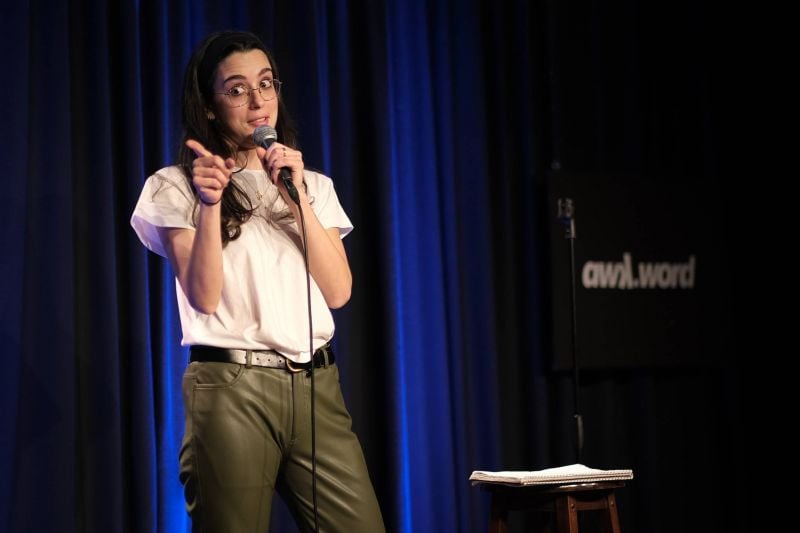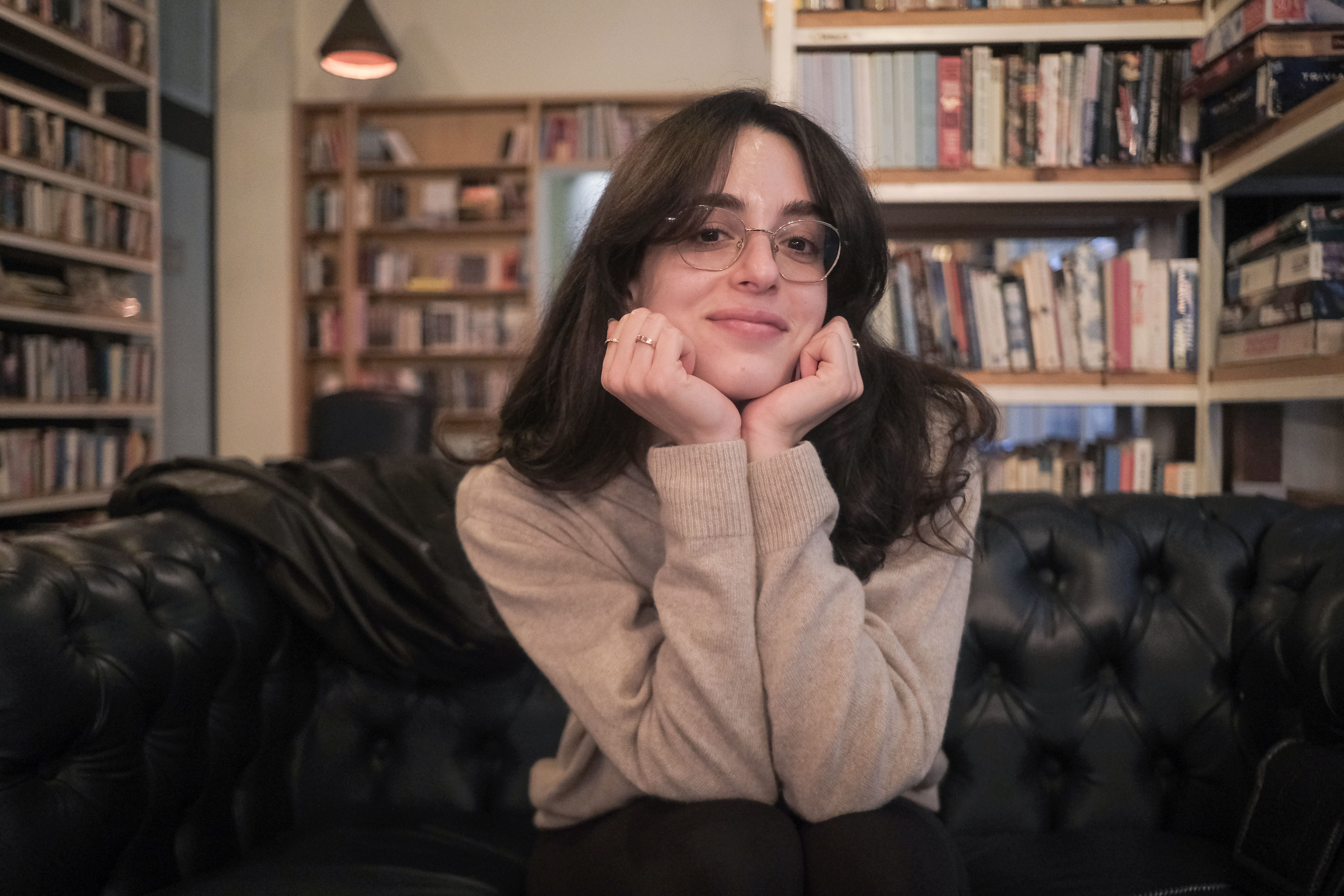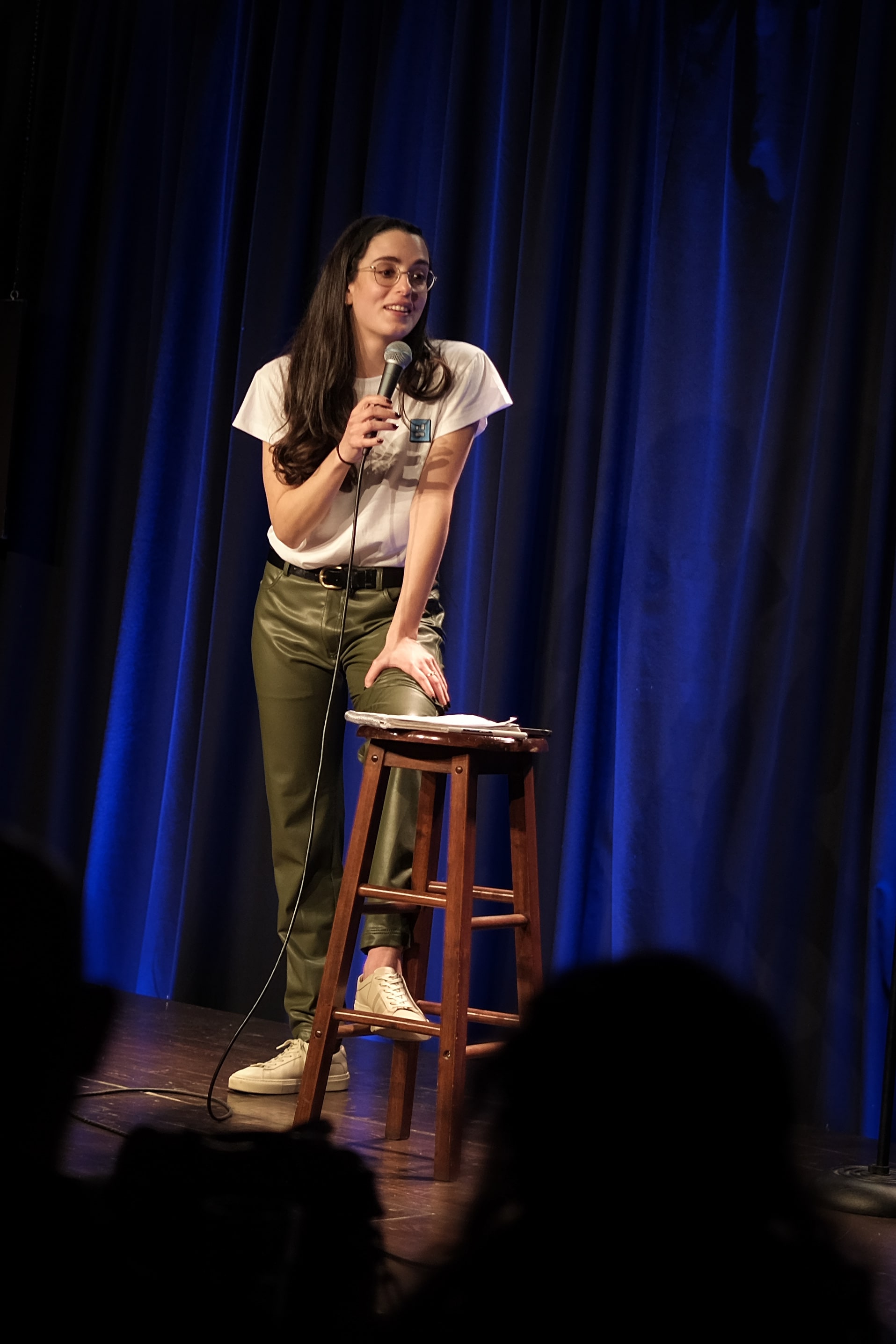
Comedian Nataly Aukar performs at KED in Beirut, Dec. 21, 2023. (Credit: João Sousa/L'Orient Today)
BEIRUT — In front of a packed crowd at KED in Beirut, Lebanese comedian Nataly Aukar — who’s on a visit back home from New York — takes the stage.
She’s bespectacled, with sneakers and a plain T-shirt tucked into vinyl trousers.
“I know I don’t look Arab ‘cause people tell me I don’t look Arab all the time; especially Arabs …But that’s the outside, it shouldn’t count, on the inside, I promise you I am very hairy and angry.”
The crowd, a mix of young and older people, many of whom are seeing her for the first time, erupts in laughter.
A native of Laylaki in Beirut’s southern suburbs, the 29-year-old comedian studied at AUB before moving to New York City eight years ago.
In 2022, she quit her tech job to do comedy full-time, becoming a growing name on the circuit. Aukar performed at Netflix’s “Netflix is a Joke” festival in 2022, and is slated to perform again in 2024.
 Comedian Nataly Aukar at Aaliya's Books in Beirut on Dec. 22, 2023. (Credit: João Sousa/L'Orient Today)
Comedian Nataly Aukar at Aaliya's Books in Beirut on Dec. 22, 2023. (Credit: João Sousa/L'Orient Today)
She still comes home to Lebanon multiple times per year to do shows and see her family, all of whom live in Lebanon. This December Aukar had to add one more show to her schedule of cracking witty jokes as the existing two were sold out.
‘Sudden, scary and unexpected’
Aukar was just 12 years old in 2006, when the war broke out between Hezbollah and Israel in July, killing more than 1,000 Lebanese civilians and damaging Lebanon’s infrastructure.
Her family moved from Beirut’s Achrafieh to Bsharri in the north for safety. Aukar still remembers her fear of the phone calls made by Israeli forces to Lebanese civilians, aimed at intimidating them.
“I remember receiving a phone [call] from [the Israeli Army] and I thought they…know we’re here [and] were going to hit the place,” Aukar tells L’Orient Today, in an interview after her set last month.
As they had dual American citizenship, Aukar’s family fled to the US in the final days of the war, via Syria.
“What was really scary was crossing the Syrian border at the time…because of tensions with the Syrian army the previous year,” Aukar says, in reference to the 2005 protests calling for the withdrawal of the Syrian army from Lebanon.
“I had never left Lebanon. It was sudden, scary and unexpected. I think that event shaped my life — not because of the war but the way it happened, leaving the country in this state. I was very attached to Lebanon, I felt that I was snatched [away] very aggressively,” she said.
Aukar’s family spent over a year in the US before returning to Lebanon.
 Comedian Nataly Aukar performs at KED in Beirut, Dec. 21, 2023. (Credit: João Sousa/L'Orient Today)
Comedian Nataly Aukar performs at KED in Beirut, Dec. 21, 2023. (Credit: João Sousa/L'Orient Today)
“What helped me move past my trauma or at least process it was talking about it and then laughing about it and seeing other people laughing,” Aukar says.
“Talking about trauma is healing; verbalizing it, putting it into words, you’re releasing it out of your body.”
One trauma she hasn’t been able to joke about, though, is the Aug. 4, 2020 Beirut port explosion. Though she was outside Lebanon at the time, the incident weighed heavily on her.
“You are not here seeing your friends and family,” she says. Her grandparents and some of her friends were injured in the blast. “My family was affected and my best friend almost died. It felt very reminiscent of 2006, when I left [and] I felt guilty that I’m gone.”
“I haven’t really joked about it, I feel that it’s not my pain to talk about and that I still haven’t processed it.”
‘People relate when they are laughing’
At 22, Aukar decided to move back to the States, where she settled down in New York.
“I liked the idea of New York and America. I grew up dreaming about big things and I wanted a place that offers that,” Aukar says.
“My dreams are a bit irrational. I want to change everyone’s mind and change their perspective about my country.”
One incident that shaped her was back in 2006, one week after arriving in the US, her parents sent her to — of all places — summer camp. She was one of the only two girls there. During a football game when they were sitting together on a bench, the other girl asked Nataly about her nationality.
When Nataly responded that she was Lebanese, the girl slid away from her. “I’m Jewish. My country is at war with you,” the other girl said, according to Aukar.
 Comedian Nataly Aukar performs at KED in Beirut, Dec. 21, 2023. (Credit: João Sousa/L'Orient Today)
Comedian Nataly Aukar performs at KED in Beirut, Dec. 21, 2023. (Credit: João Sousa/L'Orient Today)
“2006 was just five years after 9/11, so the anti-Arab sentiment was big. But I was in Lebanon until then and had never experienced the ‘Arabophobia’. After this incident, I started working on my accent to not sound Arab.”
Today, Aukar says she doesn’t face much discrimination as an Arab, especially in New York.
And yet, on Halloween night in 2021, early on in her career, she was performing a stand-up set in Connecticut. Guests at one table in the audience began heckling and shouting at her after Aukar cracked a joke about people mistaking her for being white. Others in the audience spoke out in her defense, and before long, the whole room was shouting.
A year later, at another show, she made a joke about her “bad timing” of having arrived in the US in 2016, just as Trump was elected president. A table of drunk guests snapped at her and insulted her origins. She remembers answering aggressively and asking them to leave.
“It changed my writing a little bit. When I go to a place like this, I don’t want to compromise my truth or tell them what they want to hear but instead of opening with Lebanon and being an Arab, I talk about relationships — [so] that they would understand me first. I connect with them first. And then I talk about being an Arab from Lebanon when they feel connected to me,” Aukar says.
“The beauty of comedy is that people will relate when they are laughing. Maybe it will make them feel similar and connected to my country that they know nothing about, especially a place like Lebanon.
The Oct. 7, 2023 effects
At her first show back home in Beirut in December, Aukar opens her hour-long set by talking about the situation in Palestine and how it affects Arabs around the world.
“I feel like I now have an understanding of how Arabs in the West felt in the post-9/11 era. It can be scary.”
“I feel the tension sometimes when I go on stage in a random room and say I am Arab,” she adds.
“I saw how badly so many of us are represented and how pure and good people become nonexistent in the media narrative as a way to justify bad things happening.”
But she says there’s hope. “I think my generation in Lebanon was also subject to that, being the children of traumatized war children, but we grew and questioned things about all sorts of prejudice in a country that didn’t make it easy. I believe that if we dared to grow, change and open up, then anybody else can.”
 Comedian Nataly Aukar at Aaliya's Books in Beirut on Dec. 22, 2023. (Credit: João Sousa/L'Orient Today)
Comedian Nataly Aukar at Aaliya's Books in Beirut on Dec. 22, 2023. (Credit: João Sousa/L'Orient Today)